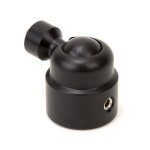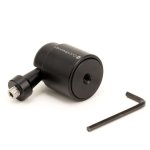Are they conical at all when unloaded? They may be Belleville springs being used to keep somewhat constant tension on the bolts through thermal cycling if it's a from the factory sort of thing.
After doing a Google Image Search, that's exactly what they are.
So, some good news. I got the crank pulley bolt out yesterday. 24in breaker bar, ghetto-fabbed pulley holder, and me nervously standing on the breaker bar took it out with no problem. I cheered, as that has been an intimidating task. Removed the water pump, timing belt, etc. Timing belt has no brand on it, but it came from Germany. Looked like it was in decent shape, but a bit frayed on the edges in places.
More good news: The heads are off completely. Photos will follow, but my preliminary observation is that one of the valves on cylinder six has a 1in gouge in the carbon buildup, and the adjacent one (same cylinder) has about a half inch gouge. Something might have fallen into the intake manifold when I changed the spark plugs and caused the valve to stay open. It also might have happened at the shop when they pulled the plenum, but my money is on my clumsiness. Expensive lesson maybe? Even if that's not the cause it's a good example of why you need to keep the intake manifold covered when you pull the plenum (which I did, so I'm at a bit of a loss).
I kinda mangled the head gaskets pulling them off, so I can't tell if there was failure there that caused the milky oil on the intake manifold when I stripped it down the second time.
Some more good news: I was initially turned off from a local rebuild by my mechanic's estimate ($5,200 for a turnkey full engine rebuild). I called a few shops myself and got two quotes for a full stock rebuild: $1,950 and $2,400 with 12mo warranties. Pretty sure the huge discrepancy is that I will be removing and reinstalling the engine myself... Just getting down to the block has been a monumental task so far.
I will be making more calls later today, but that is a damn sight better than buying a completely remanned engine. Who knows, maybe I'll be able to talk the wife into letting me spend a few extra bucks to have the cylinders bored out and the heads ported? :-D
I have to say, I'm in uncharted territory in regards to my automotive repair skills. Prior to this, the closest I've come to tearing into an engine this deeply was replacing the valve cover gasket on my 1996 Grand Cherokee. My father was a Ford mechanic for 30 years, and I worked with him a lot when I was a kid. When I was 11 or 12 he set up his old F-150 engine on a stand, and a new block on another stand next to it, and we transferred everything over (block had seized). He always got terrible mileage after that, but hey, it ran.
So with that said, as long as you're careful, you have the tools, and an eye for detail, don't be too afraid to dive in.
More information and photos to come.




